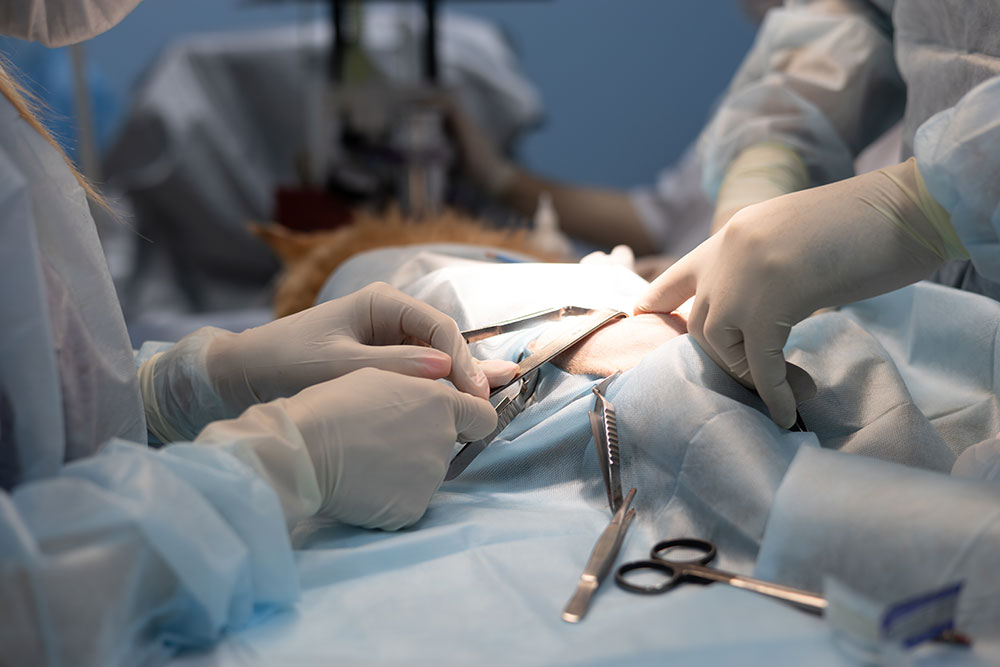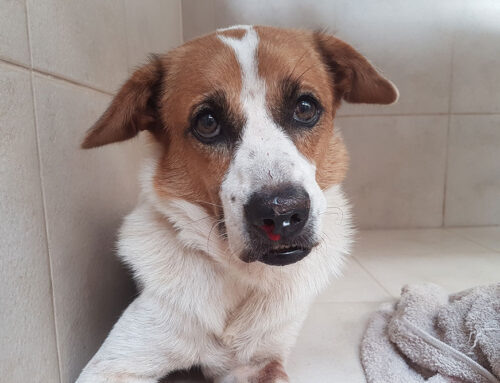A Closer Look at the Surgeries Pets Need Most Often
Every pet’s life has milestones: routine checkups, dental cleanings, vaccinations, and sometimes, surgery. From repairing a torn ligament to removing a tumor or preventing disease through a simple spay or neuter, surgical care is often a vital part of keeping pets healthy and pain-free.
At North Waterloo Veterinary Hospital, our experienced veterinarians perform procedures in a fully equipped surgical suite, using advanced monitoring, modern technology, and individualized care. With a cat-friendly environment, tailored anesthesia, and compassionate nursing, every patient receives attentive, gentle support from start to finish.
Understanding Common Pet Surgeries
While hearing your pet needs surgery can be intimidating, today’s veterinary medicine combines advanced technology, precise anesthesia, and compassionate care to make these procedures safer and recoveries smoother than ever. Knowing what types of surgeries are most common and how to prepare can help you feel confident every step of the way.
Soft Tissue Repair: Lacerations, Bite Wounds, and Abscesses
Skin and soft-tissue injuries are common in pets. Lacerations from accidents or sharp objects can easily become infected if untreated. Bite wounds may look minor but often trap bacteria beneath the skin, while cat bite injuries can form painful abscesses requiring surgical drainage.
Prompt treatment includes cleaning, removing dead tissue, and closing wounds carefully to promote faster, safer healing. For small benign growths or warts, our veterinarians can also perform cryosurgery- freezing tissue during a simple outpatient visit.
Essential Surgeries: Spaying and Neutering
Spaying and neutering are among the most common veterinary procedures, offering both preventive and behavioral benefits. Spaying prevents uterine infections like pyometra and dramatically reduces mammary tumor risk when performed before the first heat cycle. Neutering eliminates testicular cancer and helps reduce hormone-driven behaviors such as roaming or marking.
Timing depends on your pet’s breed, size, and health. Our veterinarians create customized plans to ensure the safest, most effective approach, supported by advanced anesthetic monitoring and experienced surgical nursing care.
Digestive Tract Surgeries: Removing Foreign Bodies
Curious pets often swallow things they shouldn’t- such as toys, socks, or bones- leading to life-threatening blockages. Foreign body obstructions cause vomiting, loss of appetite, and abdominal pain. Immediate imaging and surgical removal are often needed to prevent tissue damage or perforation.
Our in-house diagnostics department provides rapid results through digital X-rays, ultrasound, and laboratory testing, allowing for quick and effective treatment.
Dental Procedures: Treating Fractured Teeth
Dental health is essential to overall wellness. Fractured teeth can be painful and lead to infection if untreated. Causes include trauma or chewing on hard items such as bones or antlers.
Treatment depends on severity. Minor fractures may be restored with fillings or root canals, while severe cases require extraction. Our dentistry team uses digital dental radiography to locate hidden disease and ensure your pet’s comfort during every procedure.
Orthopedic Surgeries: Cruciate Ligament Repair
Active and large-breed dogs are particularly prone to cruciate ligament injuries. The TPLO surgery (Tibial Plateau Leveling Osteotomy) stabilizes the knee joint, prevents arthritis, and restores full movement. Early intervention and structured rehabilitation help pets regain strength and comfort within a few months.
At North Waterloo Veterinary Hospital, orthopedic procedures are carefully planned using digital X-rays and tailored anesthesia to maximize safety and recovery.
Managing Fractures and Broken Bones
Accidents and falls can lead to fractures that require surgical repair. Using plates, screws, or pins, our veterinarians realign bones and stabilize them for proper healing.
When an injury is too severe for repair, amputation can be the most humane option. Pets typically adapt quickly, regaining balance and confidence on three legs. Rehabilitation and gentle exercise help maintain long-term strength and mobility.
Cancer Treatments: Mass Removals
Cancer is one of the most common medical challenges in older pets. Early surgical removal of tumors often offers the best chance for cure or long-term management.
Some growths require wide surgical margins or follow-up therapies such as chemotherapy. The key is early detection- regular wellness exams and prompt evaluation of new lumps help identify concerns before they progress.
Urinary Tract Surgeries: Cystotomy
Bladder stones and urinary blockages- especially in male cats- can be life-threatening emergencies. Cystotomy surgery involves opening the bladder to remove stones or obstructions and restore normal urine flow.
Following surgery, prescription diets and follow-up urinalysis reduce the risk of recurrence. Our veterinary team closely monitors recovery and tailors preventive plans to each patient’s specific needs.
Specialized Care for Brachycephalic Breeds
Flat-faced pets such as Bulldogs, Pugs, and Boston Terriers often struggle with restricted airways. Brachycephalic dogs benefit from corrective surgeries that widen nostrils or shorten elongated soft palates. These procedures improve breathing, reduce snoring, and allow pets to exercise and rest more comfortably.
Hip and Joint Surgeries: Solutions for Dysplasia
Hip dysplasia surgical options depend on the pet’s age and joint condition. This hereditary disorder causes looseness, inflammation, and pain in the hips, limiting mobility.
One effective treatment, the Femoral Head Ostectomy (FHO), removes the damaged bone to eliminate painful contact. Rehabilitation and physical therapy are vital for restoring comfort and function after surgery.

Post-Operative Care and Recovery Insights
Healing begins as soon as anesthesia wears off. Every pet’s recovery plan is personalized for their comfort, safety, and lifestyle.
Pain management is the top priority. Anti-inflammatory medications, pain relievers, and nursing care ensure pets stay comfortable throughout healing. Activity restriction is equally important- short leash walks, crate rest, or confined areas prevent strain on healing tissue.
Owners should check the incision daily for swelling, redness, or discharge and use an Elizabethan collar to prevent licking or chewing. Soft-tissue procedures typically heal within two weeks, while orthopedic surgeries may require several months of guided recovery.
Some pets benefit from veterinary physical rehabilitation to rebuild strength, improve balance, and enhance joint function. Our hospital care team provides both inpatient and outpatient support, ensuring your pet receives continuous comfort and observation after surgery. We even offer post-surgical boarding to make sure your pet stays safe and comfortable after procedures.
Building a Relationship with Your Veterinary Team
Surgery success depends on trust and communication. Our veterinarians perform thorough pre-surgical exams and diagnostic testing to assess overall health before anesthesia. Detailed discharge instructions and follow-up visits ensure each patient continues to heal safely.
In emergencies- such as fractures, urinary blockages, or sudden bleeding- seek care immediately. Our compassionate team provides same-day appointments whenever possible and coordinates with after-hours emergency hospitals for urgent cases.
Surgery to Support Long-Term Health
Surgery is often a critical step toward a longer, more comfortable life for your pet. With preparation, teamwork, and compassionate care, every procedure can lead to improved health and quality of life.
At North Waterloo Veterinary Hospital, we combine skill, technology, and empathy to ensure your pet’s surgery is safe and recovery is smooth. For more information or to schedule a consultation, contact us today. Our team is here to help your pet heal, thrive, and stay healthy for years to come.







Leave A Comment